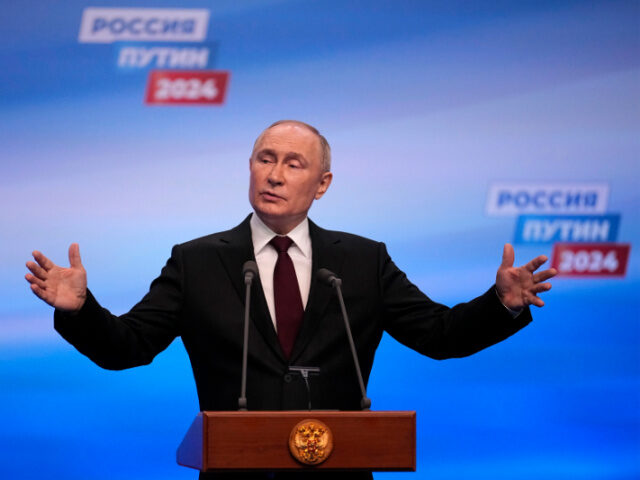
A growing list of human rights violators and authoritarian regimes around the world published messages congratulating Russian strongman Vladimir Putin on his overwhelming “victory” in a three-day sham presidential election that concluded on Sunday.
Leaders such as genocidal Chinese dictator Xi Jinping, North Korean tyrant Kim Jong-un, and the heads of Russia’s satellites in Latin America – Cuba’s figurehead “president” Miguel Díaz-Canel and his Venezuelan counterpart Nicolás Maduro – extended their support and confidence in Putin after securing another six years in power through a largely ceremonial “election” with no meaningful opposition voices on the ballot and widespread reports of voter intimidation and repression. Putin has been in charge of Russia for 25 years, first assuming the presidency in 1999 and continuing to rule via puppet president Dmitry Medvedev as prime minister from 2008 to 2012.
Putin handily defeated three opponents: Nikolay Kharitonov of the Russian Communist Party, Leonid Slutsky of the Liberal Democratic Party of Russia, and Vladislav Davankov of the New People Party. According to the Russian Central Election Commission (CEC), Putin secured over 87 percent of the vote nationwide.
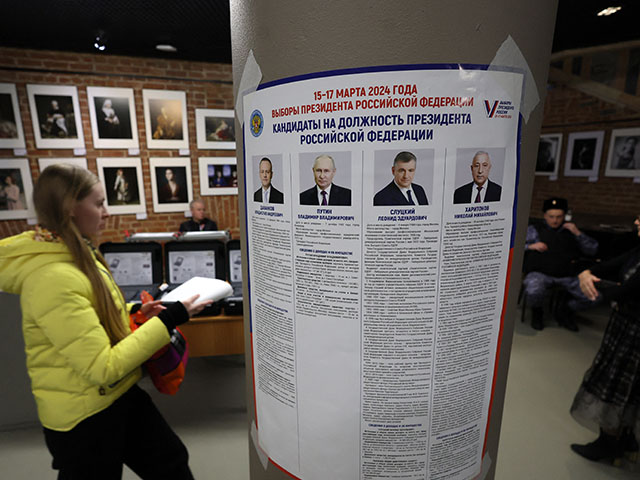
An information poster with images and biographies of the four candidates, including Russian President Vladimir Putin, is seen at a polling station during Russia’s presidential election in Moscow on March 15, 2024 (STRINGER/AFP via Getty Images).
“I believe that under your leadership Russia will be able to achieve even greater successes in development and nation-building,” Xi Jinping, who has long touted himself as one of Russia’s most reliable partners, reportedly said in a message sent to Putin, according to the Russian news agency Tass. Xi allegedly promised that the Chinese Communist Party would aid Putin in pursuing “further healthy, stable and in-depth development of the Russia-China comprehensive strategic partnership in the new era for the benefit of the two countries and peoples.”
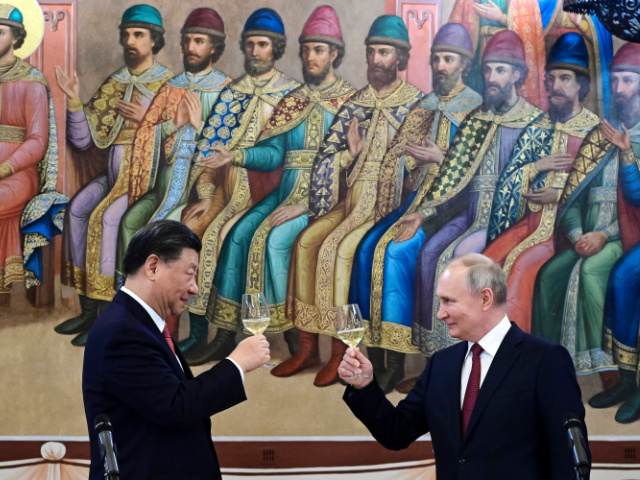
Russian President Vladimir Putin, right, and Chinese President Xi Jinping toast during their dinner at The Palace of the Facets, a building in the Moscow Kremlin, Russia, on March 21, 2023 (Pavel Byrkin, Sputnik, Kremlin Pool Photo via AP, File).
Iran, a newly minted member of Russia and China’s BRICS coalition and a longtime recipient of Russian diplomatic support, also sent a positive message to Putin.
“The President of the Islamic Republic of Iran sent congratulations on the convincing victory in the election and the re-election of Vladimir Putin as the president of Russia,” a brief message from the Iranian government, referring to President Ebrahim Raisi, read.
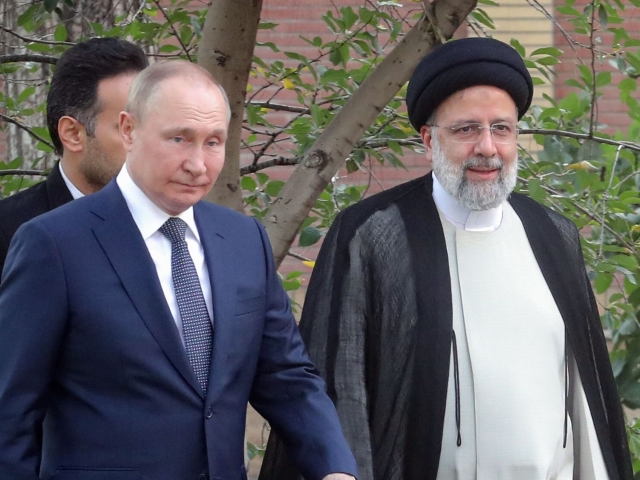
Russian President Vladimir Putin (L) meets with Iranian President Ebrahim Raisi (R) in Tehran on July 19, 2022 (Photo by Iranian Presidency / Handout/Anadolu Agency via Getty Images).
Elsewhere in the Middle East, the head of the Palestinian Authority, Mahmoud Abbas – who, in January, began the twentieth year of his first four-year term as “president” – sent a message to Putin wishing him “every success in fulfilling his obligations as well as achieving the goals and tasks currently facing the Russian people.”
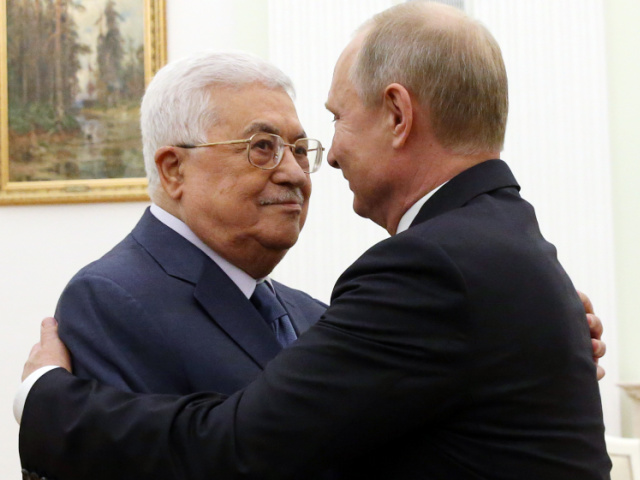
Russian President Vladimir Putin (R) greets Palestinian President Mahmoud Abbas (L) during their talks at the Kremlin, in Moscow, Russia, July 14, 2018 Photo by Mikhail Svetlov/Getty Images).
Abbas reportedly declared that he is “proud of the friendly relationship between Palestine [sic] and Russia” and thanked Putin for supporting the anti-Israel cause. The Russian government has taken on a leadership role, especially at the United Nations, in opposing the national security of Israel and supporting the agenda of the Hamas Sunni jihadist organization in the aftermath of the October 7 terrorist attacks on the Israeli homeland.
In Cuba, Díaz-Canel, who represents the 65-year-old dictatorship of the Castro family, issued his “most sincere congratulations” to the Russian strongman.
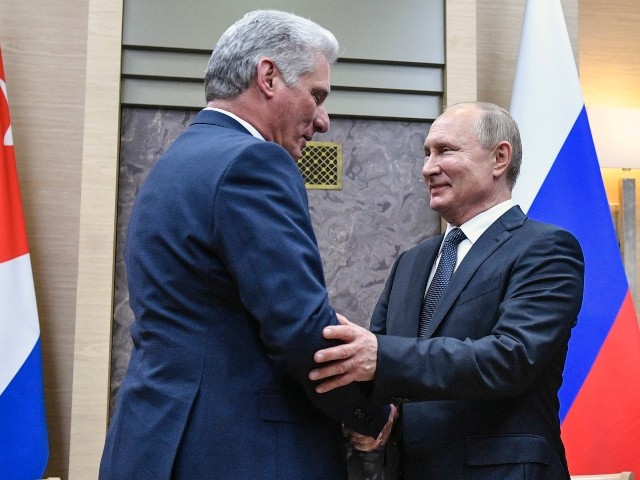
Russian President Vladimir Putin, right, and Cuban President Miguel Diaz-Canel shake hands during their meeting at the Novo-Ogaryovo residence outside Moscow, Russia, Tuesday, Oct. 29, 2019 (Alexander Nemenov/Pool Photo via AP).
Putin’s victory, Díaz-Canel wrote on Twitter, “constitutes a reliable show of recognition by the Russian people of his management.”
“We will continue to strengthen the nexus between Cuba and Russia in sectors identified for the wellbeing of our peoples,” he promised:
Nuestras sinceras felicitaciones por la reelección del Presidente Vladimir Putin.
— Miguel Díaz-Canel Bermúdez (@DiazCanelB) March 17, 2024
Constituye muestra fehaciente del reconocimiento del pueblo ruso a su gestión.
Continuaremos afianzando nexos entre #Cuba y #Rusia, en sectores identificados para el bienestar de nuestros pueblos. pic.twitter.com/UH32EOaX67
“On behalf of the Venezuelan people, President of the Bolivarian Republic of Venezuela Nicolás Maduro congratulates President Vladimir Putin and his political movement on the landslide election win and his reelection as Russia’s president for 2024-30,” the Foreign Ministry proclaimed. “We pay tribute to the Russian people for their deep commitment to democracy, which was reflected by their broad participation in the vote.”
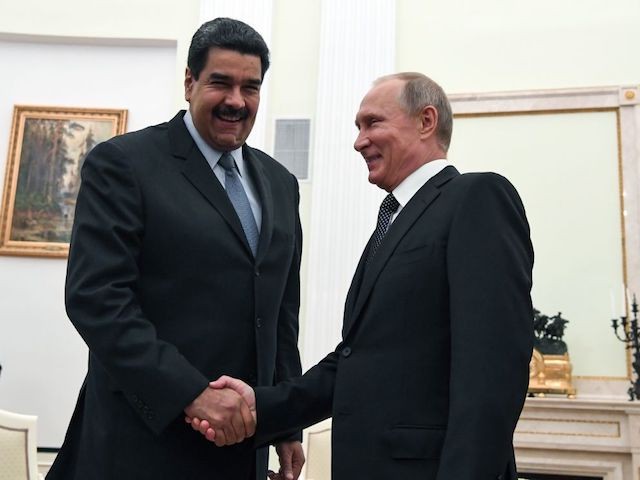
Russian President Vladimir Putin (R) shakes hands with his Venezuelan counterpart Nicolas Maduro during a meeting at the Kremlin in Moscow on October 4, 2017 (YURI KADOBNOV/AFP via Getty Images).
“Venezuela is expressing its unconditional intention to continue working closely in a strategic alliance [with Russia] in order to boost cooperation for the benefit of common interests and facilitate efforts to build a multipolar world order in the spirit of justice, equality and peace,” the statement continued.
In North Korea, Kim Jong-un – who is reportedly expecting Putin to visit Pyongyang this year – similarly issued a brief statement of congratulations “on his reelection to the presidency,” the Korean Central News Agency (KCNA), the flagship state propaganda outlet, reported.
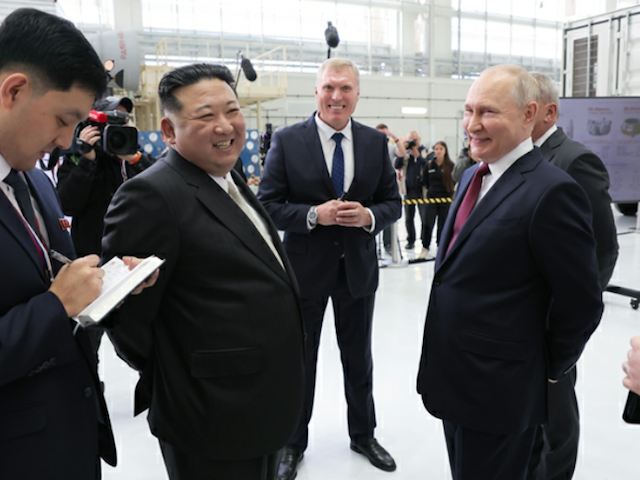
North Korea’s Kim Jong-un laughs with Russian leader Vladimir Putin during a visit to far-east Russia on September 13, 2023 (Rodong Sinmun/Government of North Korea).
The Russian CEC claimed that it documented record-high voter turnout during the election, which lasted for three days for the first time in modern Russian history. The chair of the CEC, Ella Pamfilova, claimed that those who pointed out widespread irregularities, reports of pressuring government employees into voting for Putin, and incidents such as the ban on anti-Ukraine invasion candidate Yekaterina Duntsova had a “medieval mentality.”
“[They say] that people are almost being made to vote, and now – almost at gunpoint, poor prisoners. It is such a mediaeval mentality – not to know our multinational people!” Pamfilova said on Monday, according to Russian news agency Tass. “We are convinced that our country is free, characterized by freewill, and our people are well-educated and will not tolerate pressure on them neither from the inside nor from the outside.”
Contrary to this image, however, widespread reports of acts of dissent at the ballot box emerged throughout the weekend. At least seven reports were documented of individuals pouring green dye into ballot boxes, an attempt to make the votes in the box invalid. The Moscow Times reported at least four incidents of voters attempting to set voting centers on fire in protest, including one in which “an elderly woman was detained for setting fire to a voting booth” and then apparently filming her work.
